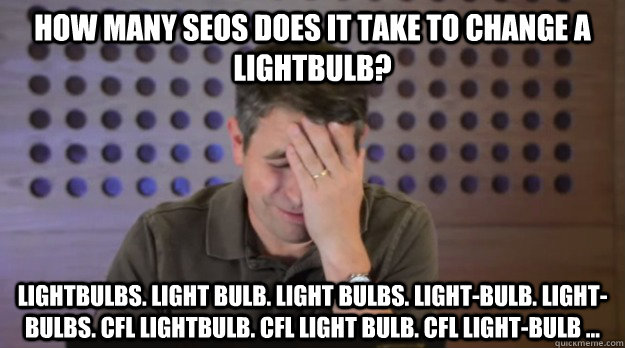Why I Don’t and Won’t Push SEO
I hear it all the time from individual clients and small business owners. “Do you do SEO?” Every time someone asks me this, it is incredibly hard for me not to explain why SEO isn’t really a thing anymore. When I do, I see eyes glaze over and feel them questioning my credibility. So, why are people are still so determined to believe in the dire importance of SEO and why do I fight so hard against selling it to clients? My spam folder is an excellent indication.

Anyone who has an online presence gets spam emails making lofty SEO claims. They promise overnight #1 or first page rankings on Google. Even Google gets these emails and they warn against falling for these claims.
Be wary of SEO firms and web consultants or agencies that send you email out of the blue.
Amazingly, we get these spam emails too:
“Dear google.com,
I visited your website and noticed that you are not listed in most of the major search engines and directories…”Reserve the same skepticism for unsolicited email about search engines as you do for “burn fat at night” diet pills or requests to help transfer funds from deposed dictators.
– Google, Do you need an SEO?
What was SEO?
The truth is that while there were once easy ways to trick search engines into moving your site up the list, search engines have been actively working to make it harder and harder for people to manipulate results. You may remember seeing some of the more blatant tricks from the late 90s and early 2000s. You scroll down to the bottom of the page and find a long list of links that contain the same words over and over.

This practice is called keyword stuffing. Search Metrics defines it as, “…when someone attempts to manipulate their position in the search results by concentrating relevant keywords.” Search engines were tweaked to ignore repeated keywords.
The evolution of keyword stuffing soon had web designers creating large blocks of text that looked like content. “Where do you go for your SEO help? We often get that question from people seeking help with their SEO. SEO is a popular topic today.” Instead of blatantly dumping keywords, they are worked into the copy too frequently and in an unnatural way. Again, search engines changed their algorithms to keep people from using these tactics to push their sites above sites with helpful content.
Over time, web designers have gone from creating large, ugly blocks of useless text to stuffing keywords in a website’s meta data. Think of this as the same kind of manipulation as the front-end keyword stuffing, but visitors to a site can’t see it without viewing the page’s source code. Your web browser sees it, and thankfully, search engines do too.
Why did/does SEO change?
You may be wondering why search engines make it so hard for people to have more control over getting their sites a better ranking. You could be one of those people who feel like they have to start completely over with your website because your previous SEO person used old tactics that are now making it harder for people to find you online. The first thing is to remember that it’s not personal. Google has nothing against you or your business, they just don’t work for you.

Search engines want their users to end up on sites that have the worthwhile and relevant content they were looking for. Their business is connecting people with the answers they need. So, when they rolled out their two biggest changes to their algorithm—named Panda and Penguin—they were actually doing your clients/customers a favor.
[SEO] wasn’t always a scam, it just stopped working on April 24th, 2012. That was the day Google released an algorithm update dubbed “Penguin” that unquestionably and permanently sealed their fate as victors in a 14 year war between them and those who tried to rank higher by gaming the system. While many lament its death, SEO really was cheating, and it was bad for consumers. The Internet is better off without it.
– Brad Urani, Techli.com
What is SEO now?
So what do you do now to make sure people are finding your site? If the tricks that SEO experts used to use don’t work anymore, what are they doing? The answer should be to create quality organized content that follows web best practices. Build a good website.
What do I mean by a “good” website? Good websites have content that is unique to you and your business. It clearly tells people who you are, what you do, how to find you, how to contact you, and any other information about your area of expertise. Good websites are tools that your audience/clients turn to because it’s the definitive source for your specialty. They rely on it, they come back to it, and they share it because it’s good. This is called content marketing.

Content Marketing Institute sums up content marketing as, “…a strategic marketing approach focused on creating and distributing valuable, relevant, and consistent content to attract and retain a clearly-defined audience — and, ultimately, to drive profitable customer action.” However you define it, content marketing is a new way of thinking about how we should build websites. It’s a customer focused way of crafting your message that ensures you will connect in an authentic way with the right people. Content marketing is not a quick-fix way of improving your rankings though.

Think of the content on your website as a direct conversation with your customers. If you’re talking to someone who is important to you, and they aren’t responding well to what you’re saying, you change the way you say it. That’s how you should approach your web content. This includes the stuff on your website and your social media accounts. It should all be consistent, but also flexible. There are many tools to track how people respond to your message, and if one way of interaction doesn’t get the results you’d like, you can tweak your approach. This trial and error is why you have to look at content marketing as a long term strategy. It’s also not something from which you can expect immediate results.

It can be frustrating to invest time and money into your marketing and not have concrete results right away. It’s important to understand that even when you completely change the way you talk to your audience, you won’t have top rankings overnight. Even if you successfully create a good website, and despite claims made by SEO scammers, you might not get the number one spot. Why is that?
No one can guarantee a #1 ranking on Google.
Beware of SEOs that claim to guarantee rankings, allege a “special relationship” with Google, or advertise a “priority submit” to Google. There is no priority submit for Google. In fact, the only way to submit a site to Google directly is through our Add URL page or by submitting a Sitemap and you can do this yourself at no cost whatsoever.
– Google, Do you need an SEO?
So, when you’re looking for someone to help you improve your search engine rankings, find someone who thinks primarily about improving your ongoing relationship with your customers, not someone focused on quick tricks or automated tools. When hiring someone to do your SEO make sure they can provide you with a plan, and ask them if they are familiar with Google’s Webmaster Guidelines. If they mention any of the following things that Google specifically says to avoid as tactics they use, you should pass:
- Automatically generated content
- Participating in link schemes
- Creating pages with little or no original content
- Cloaking
- Sneaky redirects
- Hidden text or links
- Doorway pages
- Scraped content
- Participating in affiliate programs without adding sufficient value
- Loading pages with irrelevant keywords
- Creating pages with malicious behavior, such as phishing or installing viruses, trojans, or other badware
- Abusing rich snippets markup
- Sending automated queries to Google
Learning a little about what not to do can protect you from SEO scams and scammers, and you can get your website performing at the level it should. Content marketing is the new SEO, and it’s a more genuine way to connect with your audience while providing meaningful information.


